Breadcrumb
© JL Again
Workshop: Towards National Health Objectives
In 2017, Belgium and WHO signed a country cooperation strategy (CCS) committing Belgium and WHO to collaborate in five priority health areas over a period of six years (2016-2022). The first Strategic Priority of this CCS mentions the initiated process of both the federal and regional health ministers to develop national health targets (the Flemish government already adopted a list of health targets in 2000). This initiative was also included in the coalition agreement of the Vivaldi-government (September 2020). Where does Belgium stand on this? What obstacles are still to be overcome? Can we learn anything from successful examples abroad? And in what way can expertise on other political levels (regional, European, global) be used during the different stages of this process?
PROGRAM
13:30 Welcome
13:35 Intro by Pieter Van Herck
13:40 Tina Van Havere (Cabinet of Social Affairs and Public Health): Health objectives: State of the Art
13:55 Sara Willems (UGent): View from academia
14:10 Ilse Weeghmans (Vlaams Patiëntenplatform): National health objectives: the patient's perspective
14:25 Q&A
14:55 Break
15:10 Pedro Pita Barros (Universidade Nova de Lisboa, and member of EPXH): Improving health systems: a view based on the works from the EXPH - Expert Panel on effective ways of investing in health
15:30 - 16:00 Q&A
Pedro Pita Barros (PhD in Economics) is the BPI | Fundação “la Caixa” Professor of Health Economics at Nova School of Business of Economics, Universidade Nova de Lisboa. He is a member of the European Commission’s “Expert panel on effective ways of investing in health”, a member of the Portuguese National Council of Ethics for the Life Sciences, a member of Portuguese National Health Council, Past-President of the Portuguese Association of Health Economics, and Past-President of the European Association of Health Economics. His research focuses on health economics and on regulation and competition policy and appeared in many academic journals. Pedro Pita Barros has also several books on health economics (in Portuguese and English). He serves on the editorial boards of academic journals in the field of Health Economics. He acted as consultant for both private and public entities, in Portugal and at the European level, in the areas of health economics, competition policy and economic regulation.

Tina Van Havere is an advisor at the Cabinet of Social Affairs and Public Health, where she provides advice on drug prevention and vulnerable groups. Before she took on the role as advisor to Minister Frank Vandenbroucke, she was a lector at the Hogent, where she conducted research and taught in the social sciences, in particular orthopedagogics. Her research focuses on drug and alcohol abuse with youngsters. From 2002-2009 she was a staff member of VAD (Vlaams Expertisecentrum Alcohol en andere Drugs) where she conducted research and worked on policy on the use of drugs in nightlife and youngsters.
Pieter Van Herck is health care and covid-19 advisor at the cabinet of Deputy Prime Minister and Minister of Justice and the North, Vincent Van Quickenborne. Before joining the cabinet he spent more than ten years conducting research into health care policy at the CZV (now LIGB) at the KU Leuven. He also worked at think tank Itinera and was a senior advisor at Voka (Vlaams Netwerk van Ondernemingen) for seven years (Vlaams Netwerk van Ondernemingen. Pieter’s work is mainly focused on supporting structural reforms in prevention, welfare and care and the covid-19 management strategy.
Ilse Weeghmans is director of the Flemish Patients Platform (Vlaams Patiëntenplatform - VPP), an independent platform of more than 115 patient organizations in Flanders, which strives for an accessible care system, tailored for the patient and their environment. VPP aims to improve the quality of life of the patient and their environment through the realization of participation and representation in the organization and development of the policy on health in all its aspects and at all levels.
Sara Willems leads the Equity in Health Care research group of the department of Public Health and Primary Care of Ghent University, an interdisciplinary research group leading or partnering in numerous national and international research projects on equity in primary care. At the start of the covid pandemic Sara Willems initiated PRICOV-19, an international study collecting data in 38 countries on the impact of covid-19 on the organization of primary care, quality of care and equity in the access to care and the processes of care.

Er zijn nog geen foto's toegevoegd voor dit event.
